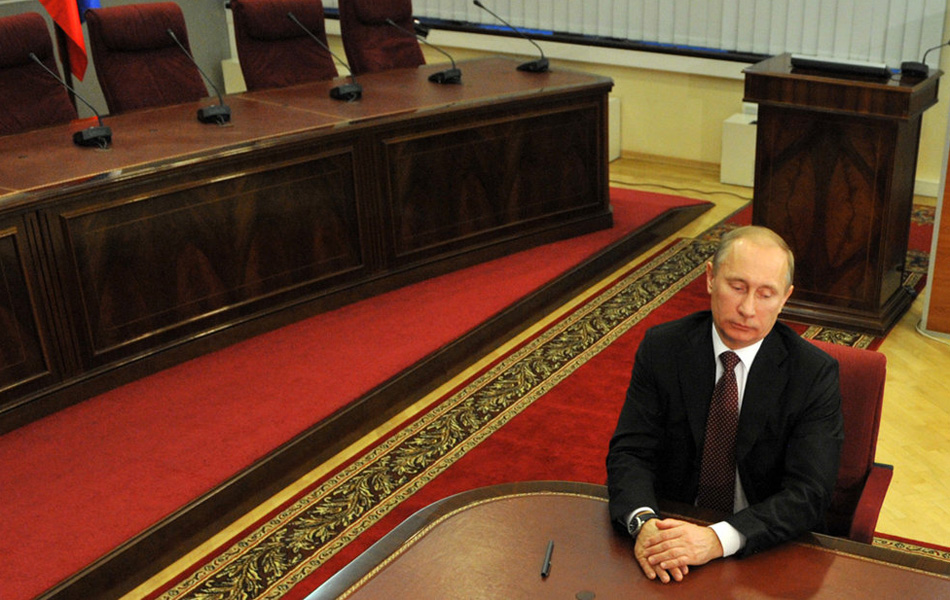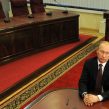
Putin Tries to Regain Initiative While Remaining Out of Touch
Publication: Eurasia Daily Monitor Volume: 9 Issue: 10
By:

There were no New Year holidays for Prime Minister Vladimir Putin and his sycophants because the need to take back the political initiative from the opposition was urgent. The next mass rally in Moscow is scheduled for February 4, so they had only three weeks for re-establishing the dominance in the electoral arena and mobilizing the support base. The Kremlin counter-offensive has indeed been launched along many axes: from the opening of the “candidate-Putin” website (https://www.putin2012.ru/) to the dressing down of insufficiently loyal governors and a lengthy meeting with a select few representatives of the legion of amateur fisherman (Moskovsky Komsomolets, January 12). The only kind of activity that Putin is reluctant to engage in is public appearances, since every whistle is certain to be amplified in the blogosphere, consequently the only audience where he felt safe was the State Prosecution staff meeting (Rossiyskaya Gazeta, January 13). Everything appears to be going smoothly, but every well-calculated image-booster adds to the pool of disenchantment with and irritation against the all too familiar Mr. Putin.
What has accentuated this feeling of déjà-vu is the program for the new presidential term, which Putin has allegedly penned himself and published on his new website inviting comments and suggestions. The discussion has instantly acquired a very undesirable character with an avalanche of suggestions to take a long break (Moskovskiy Novosti, January 13). The program is indeed so wanting in fresh ideas and plentiful in hollow promises that many commentators conclude that Putin has given up on winning support in the “thinking classes” and targets the electorate that prefers paternalistic stability (Vedomosti, January 13; Novaya Gazeta, January 12). This is a deep stratum in Russian society, but many among the have-nots are offended by the shameless corruption in the ruling bureaucracy and vast income inequality. Putin may think that he knows how to connect with the “working class,” but his populism has become too distant and arrogant to be convincing.
The main strength of his electoral platform is supposed to be Russia’s economic growth, and Putin presents it as his personal achievement, failing to mention the impact of high oil prices. The macro-economic figures are, however, rather meaningless for his core electorate, which knows first-hand that its real income is falling and suspects that petro-revenues are simply stolen (www.newsru.com, January 13). Inflation has fallen due to the massive outflow of capital, but investment activity is depressed for the same reason, and Putin’s emphasis on a “new industrialization” is irrelevant for the economy so profoundly dependent upon the export of hydrocarbons (RBC Daily, Moskovskiy Novosti, January 13). His trademark “manual management” guarantees that bureaucratic predation would dominate over business interests in making the market a safer place, is a recipe for stagnation even in the best possible “barrel-goes-sky-high” scenario (www.gazeta.ru, January 12).
The economic crisis has certainly hit the West harder, but Russia cannot exploit its position of relative strength because the Kremlin’s desperate preoccupation with the budding domestic revolution has brought its foreign policy almost to a complete halt. President Dmitry Medvedev’s visit to Brussels last December for the EU-Russia summit was free of any content and his non-meeting with NATO Secretary-General, Anders Fogh Rasmussen, was a non-issue (Kommersant, December 19). The port-visit of the aircraft carrier Admiral Kuznetsov to Syria was not cancelled because the Commander-in-Chief – and Medvedev still formally performs this function – was unable to reach a decision or to make this major blunder with Putin (RIA Novosti, January 10). The serious escalation of tensions around Iran attracts very little attention in Moscow, which disapproves of the expansion of the Iranian nuclear program but is content to follow the lead of China (www.gazeta.ru, January 12).
One foreign policy resource that has stopped paying any domestic dividends is anti-Americanism, and every attempt to portray the protests as “subversive activity” financed from abroad backfires in demands to present evidence and in better fund-raising for the next rally (Ekho Moskvy, January 14). One particular issue that has long been a thorn for Russia’s foreign policy and now has become a focal point in the domestic political crisis is the persecution of Mikhail Khodorkovsky and his associates (Nezavisimaya Gazeta, December 30). Even such “anti-oligarchic” presidential candidates as the die-hard Communist Gennady Zyuganov find it opportune to promise their immediate release (www.grani.ru, January 12). Khodorkovsky is cautiously optimistic about the revival of politics in Russia, but argues that Putin’s regime has exhausted its reserves to such a degree than any crisis could turn out to be the last one (www.newsru.com, January 12). Putin knows that the ambitious oligarch he sought to crush in order to discipline the others has grown into a potent symbol of resistance to his authority, so setting him free is out of the question. The tactic of splitting the opposition by engaging it in negotiations on minor concessions fails this test because the first question that is placed on the hypothetical roundtable is the freedom of political prisoners.
Putin finds himself trapped in a bad dilemma where the use of old political tricks for consolidating his traditional sources of strength, makes him an old-timer who is stuck in the past, and every attempt to initiate reforms invites parallels with Medvedev’s bogus “modernization.” He knows the value of information, but has long placed himself in a cocoon where lackeys feed him only the news they presume he wants to hear. The crowd of courtiers still simulates the habitual milieu where his every caprice becomes an executive order and each joke shines as a word of wisdom. Putin may despise this servility, but he firmly believes that he is loved and respected by the vast majority of Russians – so there could not possibly be any alternative to his leadership. He refuses to learn the simplest of introductions to the Internet, where bloggers ridicule his pompous style; he cannot allow a suspicion that his “loyal subjects” turn away from TV screens because the propaganda lies have become too tired. His greatest departure from reality is in the self-deception that in just six weeks all the anxiety will be over and his presidency will be safe for the next six years.




